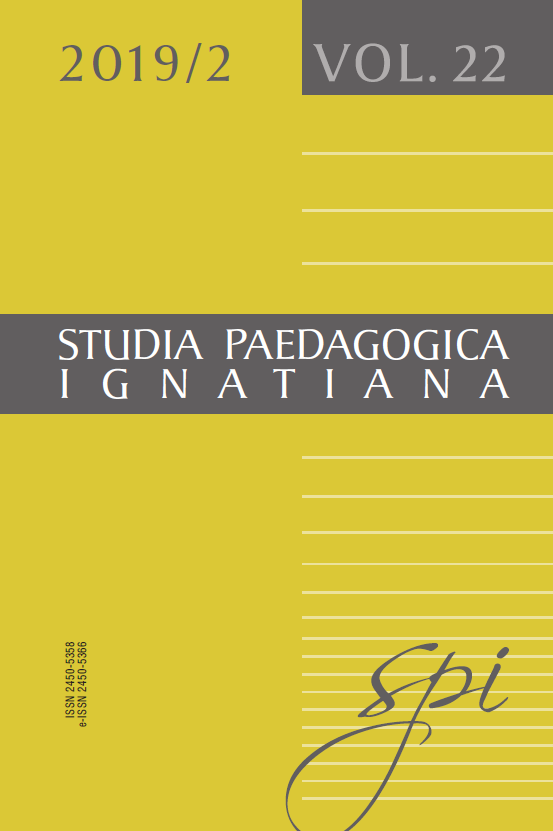Time Management of Youth in the Context of Family and School Environment
DOI:
https://doi.org/10.12775/SPI.2019.2.007Keywords
time management, youth, parents, teachers, schoolAbstract
Family and school are important spaces influencing the acquisition of competences in time management by students. Each of these spaces occupy a particular position in the process of youth development. The family teaches planning and time management. Teachers’ work should continue to foster skills in a secondary development context. The compatibility of these environments is a prerequisite for effective time budget planning by the young people. Considering the role of time in the life of an individual, the aim of the research was to know what is the time budget of students and how the space of the family and school environment is conducive to its development. In order to collect the empirical data, charts were used in which 97 tested pupils from secondary schools were asked to show the amount of time devoted during the day and week to various activities. Other aspects of time management by the young people as well as the participation of family and school as significant places in which young people reside were determined based on a questionnaire survey. The obtained results lead to the conclusion that staying at school and doing homework dominates, which can be explained by the fact that education is the basic form of youth activity. However, the time devoted to it significantly limits free time, which does not always allow for sufficient rest. It was noticed that the way of spending time with parents is passive, while teachers to a small extent compensate for unfavorable patterns of time management shaped in the family.
References
Bardziejewska M., Okres dorastania. Jak rozpoznać potencjał nastolatków?, w: Psychologiczne portrety człowieka, red. A.I. Brzezińska, GWP, Gdańsk 2005, s. 345–377.
Barnes K., Wywieranie wpływu, przeł. Ł. Tuszyński, GWP, Gdańsk 2005.
Boyd D., Bee H., Psychologia rozwoju człowieka, przeł. A. Wojciechowski, Zysk i S-ka Wydawnictwo, Poznań 2008.
Chomczyńska-Miliszkiewicz M., Pankowska D., Polubić szkołę, WSiP, Warszawa 1995.
Czerepaniak-Walczak M., Od próżniaczenia do zniewolenia – w poszukiwaniu dyskursów czasu wolnego, w: Pedagogika społecz-na, red. E. Marynowicz-Hetka, Wydawnictwo Naukowe PWN, Warszawa 2007, s. 219–236.
Dryden G., Vos J., Rewolucja w uczeniu, przeł. B. Jóźwiak, Wydawnictwo Moderski i S-ka, Poznań 2000.
Farnicka M., Liberska H., Transmisja międzypokoleniowa – procesy zachodzące na styku pokoleń, w: Psychologia rodziny, red. I. Janicka, H. Liberska, Wydawnictwo Naukowe PWN, Warszawa 2014, s. 185–201.
Izdebska J., Media elektroniczne jako obszar zainteresowań współczesnej pedagogiki społecznej, w: Pedagogika społeczna, red. E. Marynowicz-Hetka, Wydawnictwo Naukowe PWN, Warszawa 2007, s. 518–533.
Jak żyć z ludźmi. Program profilaktyczny dla młodzieży, MEN, Agencja Informacji Użytkowej, Warszawa 1989.
Mendel M., Kategoria miejsca w pedagogice, w: Pedagogika miejsca, red. M. Mendel, Wydawnictwo Naukowe Dolnośląskiej Szkoły Wyższej Edukacji TWP, Wrocław 2006, s. 21–37.
Nalaskowski A., Przestrzenie i miejsca szkoły, Oficyna Wydawnicza „Impuls”, Kraków 2002.
Perry R., Teoria i praktyka. Proces stawania się nauczycielem, WSiP, Warszawa 2000.
Pisarska A., Ostaszewski K., Bobrowski K., Czynniki ryzyka i czynniki chroniące związane z problemami internalizacyjnymi młodzieży w okresie późnego dorastania, „Postępy Psychiatrii i Neurologii” 2018, t. 27, nr 4, s. 261–280.
Psychologia społeczna, red. A.S.R. Manstead, M. Hewstone, S.T. Fiske, M.A. Hogg, H.T. Reis, G.R. Semin, przeł. J. Gilewicz, Jacek Santorski & Co Wydawnictwo, Warszawa 1996.
Świętochowski W., Rodzina w ujęciu systemowym, w: Psychologia rodziny, red. I. Janicka, H. Liberska, Wydawnictwo Naukowe PWN, Warszawa 2014, s. 21–45.
Uczenie się metodą projektów, red. B.D. Gołębniak, WSiP, Warszawa 2002.
Vasta R., Haith M.M., Miller S.A., Psychologia dziecka, przeł. M. Babiuch, WSiP, Warszawa 1995.
Zielińska M., Jak reagować na agresję uczniów?, Harmonia Universalis, Gdańsk 2012.
Zimbardo P., Boyd J., Paradoks czasu, przeł. A. Cybulko, M. Zieliński, Wydawnictwo Naukowe PWN, Warszawa 2009.
Downloads
Published
How to Cite
Issue
Section
License
By submitting an article, the author declares that:
they are the author of the article (hereinafter referred to as the Work) and:
- is entitled to exclusive and unlimited copyright to the Work,
- is entitled to dispose of the copyrights to the Work.
The Author grants the Jesuit University Ignatianum in Cracow a free, non-exclusive, territorially unlimited license to use the Work in the following fields of exploitation:
- publishing the Work in paper, digital or magnetic form;
- multiplying the work by any method, without limiting the number of editions or copies;
- distribution of the work and its copies in any form, including marketing, sales, lending, and lease;
- placing the work in a computer memory;
- distribution of the work in information networks, including the Internet;
- public performance, exhibition, display, reproduction, broadcasting and re-broadcasting, as well as making the Work available to the public in such a manner that everyone could have access to it at a time and place chosen by themselves;
- within the scope of dependent rights to the Work, covering, in particular, the right to make necessary changes to the Work, resulting from editorial and methodical preparation, as well as to make translations of the Work into other languages.
The license right shall be transferred the moment of transfer of the Work to the Jesuit University Ignatianum in Cracow. The Jesuit University Ignatianum in Cracow is entitled to grant sub-licenses to the Work in terms of the right granted. The license shall be limited in time for a period of 15 years from the date it is granted.
Stats
Number of views and downloads: 1069
Number of citations: 0



